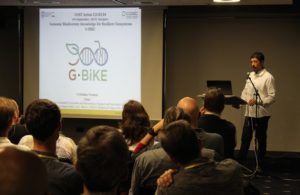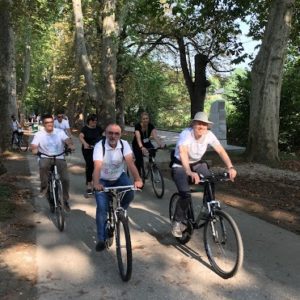G-BIKE: 1st Training School in Genomic Biodiversity for Resilient Ecosystems
Source: G-BIKE Website
In a rapidly changing environment, the resilience of ecosystems depends ultimately on species adaptability. G-BIKE aims to provide tools for assessing, monitoring and managing the genetic resilience and related adaptive potential of wild and captive populations in the EU. Applications for the 1st G-BIKE Training School are now open!
Genetics for conservation

G-BIKE meeting in Sarajevo. Source: G-BIKE Website
Although genetic data can be obtained for most organisms, the standardization of protocols for detecting and monitoring species’ genetic diversity, and their potential for adaptation, is still lacking. G-BIKE hopes to assist scientists and practitioners across the EU, and particularly in COST Inclusiveness Target Countries, to integrate genetic and evolutionary knowledge into conservation planning policies.
Funded by the European Cooperation in Science and Technology (COST), the project also strives to promote cross-border management and long term monitoring programs of evolutionary potential in order to ensure persistence of populations and species, and the continued supply of nature-based ecosystem services.
Apply for the 1st G-BIKE Training School
Applications are now open for the 1st G-BIKE Training School that will be held in La Valletta (Malta) between the 20 and 22 January 2020. The event is entitled ‘Genomic tools for conservation: a practitioner’s guide’ and is mainly, but not exclusively, addressed to practitioners. The aim is to present, in the most comprehensive manner, how can genetics and genomics help to solve practical conservation and management problems.
The ‘Genomic tools for conservation: a practitioner’s guide’ will present, how genetics and genomics can help solving practical conservation and management problems.

G-BIKE meeting in Sarajevo. Source: G-BIKE Website
The school should also work as a platform for scientists and practitioners to exchange information and ideas, to explore and clarify where and when genomics can make a difference in every day conservation activities within an EU policy and legislative framework. At the beginning, trainees will be asked to offer a short presentation about the main conservation challenges of their current jobs where they think genetic tools might help.
At the end of the School, participants will revisit the presentations and discuss the options and potential strategies that can be applied, using the genomic and analytical tools described during the School.
This School may also be relevant to graduate students about to embark on conservation genomics projects, to help them develop workplans, and just as important, to allow them to make their work policy and management oriented from the outset.
Find more information about the programme and trainers, and apply here before December 8th.
